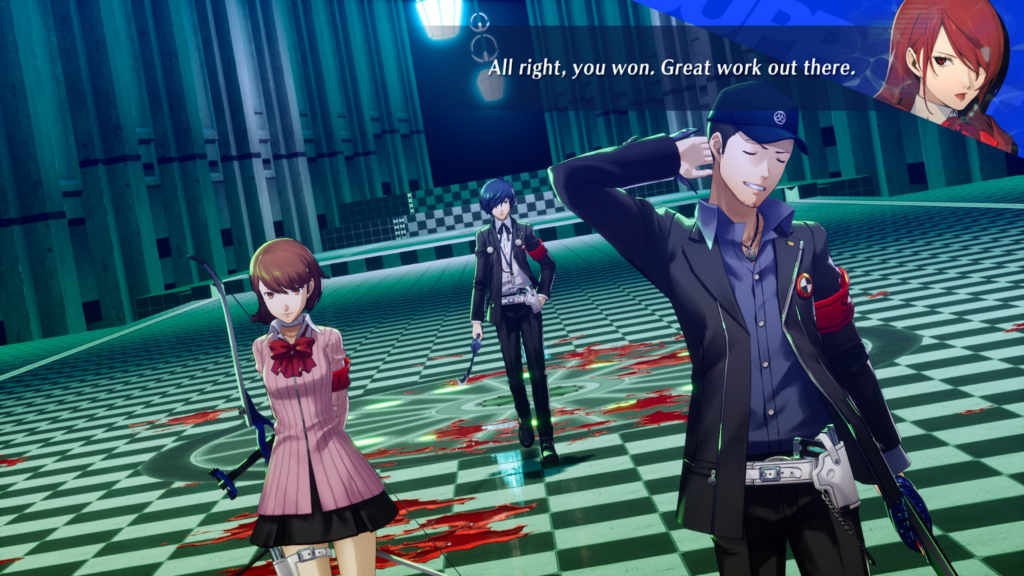Baby, baby, baby, baby, baby, baby, b-baby~!
Disclaimer: This review was originally published through EXOSIA Project.

I’m one of those who entered the Persona franchise through Persona 5 and from there worked my way to playing different Persona games—even the forgotten ones—and, I have to say, Persona 3 is a game I thoroughly enjoyed so I have high hopes for the Persona 3 Reload to be a great one, especially that there has been a trend of remaking games, only for it to be worse than the original.
This is JJ-kun of EXOSIA Project bringing you my review of Persona 3 Reload!

Persona 3 is definitely a fan favorite among the fans of the Persona franchise and ever since getting Persona 5, and several spinoffs such as Persona Dancing and Q, among Persona 3, 4, and 5, only 3 is not available in modern consoles. Even then, the fans are divided on which version is the definitive one due to differences between the FES and Portable versions, both having exclusive features. Unfortunately, Persona 3 Reload is the remake of the original Persona 3 and not of FES or Portable—that means no The Answer or FeMC. Still, enjoying the game, I’m looking forward to this version.

In Persona 3, subsequently Persona 3 Reload, you play as Makoto Yuki who transferred to Gekkoukan High School and moved to Iwatodai Dormitory. In this dormitory, Makoto was met with supernatural phenomena and was attacked by Shadows. This event made Makoto and the rest of those in the dormitory discover that he can, like the others, summon Personas leading to him joining the Special Extracurricular Execution Squad (SEES) whose goal is to eliminate all Shadows during the Dark Hour to gain peace in the world, all the while living their daily lives as normal high school students.
The story starts very slowly, from the introduction to the time when they let go of the guiding ropes. While it tackles deep philosophical messages, the game still took a long time to get there, much like the original game. It’s like, there’s almost very little that’s happening from the beginning to the resolution, but when you get to the climax part everything just crashes you down, drowning you with all the twists and lore of the game. I get it, Persona 3 served as the reboot of the Persona franchise, and it was very experimental, being different from the first two games, but this is the remake in 2024. They could’ve tweaked it in ways that the story would not feel as draggy as it was in the original.
If you have played the original, then you already know what happened and what will happen. It is still the same game, but with improvements in gameplay and visuals. I’ll have to say though, ATLUS did their best to rectify some of the pacing issues the story has in this game, like rearranging some events in a way that would still make sense in the bigger picture. The story is good, but the execution is subpar. It is still the biggest flaw in this game that I see, despite being a good one.
If anything, one of the great things that Reload did story-wise is the additional lore we get with the characters and their relationship with the protagonist through the Link Episodes, which consequently gives our characters passive abilities to have greater advantages in battles!

Typically, when remaking a game, a lot is at stake; from story changes to the application of new gameplay elements, and visual graphics. Just a little change can make or break the remake but Persona 3 Reload has that on the mark! Visually speaking, I’m quite amazed at how the characters and the world of Persona 3 were beautifully translated to the looks that Persona 5 went for—improved on it, even!
There is also an aesthetically pleasing user interface that I could not get enough of. It’s cool, flashy, pleasing to the eyes, and it’s very animated! Every menu you go to is just a new experience and a new slide of animations. It’s remarkable even to know that it was specifically designed with the lore in mind, with it representing the protagonist’s consciousness, of their psychological state. The detail they put in this game is just phenomenal.
Furthermore, I also appreciate the fact that, instead of applying Persona 5’s third-person view, ATLUS decided that Reload would still retain the fixed camera angles. While that is a very small detail, it made the game feel like you’re playing the original game while feeling brand-new. It’s something that a lot of remakes are missing but ATLUS did amazing.
There’s also Tartarus. See, in the original, the different blocks of Tartarus are mostly just recolored versions of each other. In Reload, each and every block has its different aesthetic design and layouts. This is one of the issues I had with the original game. Tartarus felt like a repeating map that made it very boring to traverse. However, this is less the case for Reload for me due to the said solution, but the tower is still high so there may still be times that it will feel draggy, one that you want to just skip to proceed immediately to the next floor to see the end and get the Old Documents. But hey, new interior designs!
Finally, in terms of the cutscenes, it was quite uneven. As much as I enjoyed the anime cutscenes in Persona 5, it seems as though they rushed the animation and production quality of the new anime cutscenes in Reload and the characters didn’t look natural in their own right. Fortunately, the in-game engine cutscenes were able to bring it up from the hellhole that is the anime cutscenes, and most of the cutscenes were done through the in-game engine so that was a relief.

This department is a hit-or-miss, hands down. The original soundtrack was already perfect and I can see that ATLUS aimed for a more modernized, remixed version of the soundtrack to make it uniform for the theme they were going for in the remake. However, some rearranged soundtracks just felt out-of-place, and unnatural, and some took some time to get used to. Maybe it’s just because I’m already used to the original soundtrack that these new versions don’t feel natural to me, but it sticks out. For example, the pitch change on the chorus of Mass Destruction, “Ooh, yeah. Dada-dada, dada-dada, Baby, baby. Da-dada-dada, dada-dada” just sticks out so much and didn’t feel natural for me; especially the “Baby” part when it was sung as “Babeh” instead of “Bay-bee” was the normal one for me. The new versions of Deep Breath and Master of Tartarus felt natural and improved. These are just some of the examples, but there’s a huge thematic shift with the soundtracks.
May I also give huge props to the new soundtracks added to the game? It’s Going Down Now, Full Moon Full Life, Color Your Night, and The Meaning of Armbands are all just hype music that set the tone of Reload. It’s as if ATLUS’ way of saying, this is still the same old game that you loved with a breath of freshness in it.

Where do I start? I have to say that this game is the definitive Persona experience, gameplay-wise. Whatever we’ve had in the original, throw it out the window because Reload improved and expanded on it. Following the changes to the franchise that Persona 5 did, it made the gameplay of Reload streamlined and smoother than it ever was. Let me tell you how, while omitting some quality of life changes since those are just some of the aspects that you have to experience.
The core gameplay of Persona 3 is that you run through Tartarus, defeating shadows in a turn-based action, all the while living as a lively high school student with varying after-school activities.
On the daily life aspect, there are now more ways to boost Social Stats. As we know, Social Stats are requirements for unlocking several features in the game, not limited to Social Links. It’s also faster to shift from one place to another and you can now run! Furthermore, the overworld map now also includes a marker if a Social Link event is available along with these Social Links sending you notifications by texting you on your in-game phone.
In combat, they used templated it from Portable (so you control the actions of each character) while including changes from FES. Aside from balancing Personas and skills, they also included new features such as the new Theurgy system which acts like a Limit Break of sorts that fills up differently for each character. Baton Pass from Persona 5 also makes a return in Reload though it is now renamed to Shift. Unfortunately, the damage multiplier from Baton Pass has been removed. Another mechanic update they included would be the weakness mechanic which was updated to be more akin to that of Persona 5; attacking Shadows until you find the weakness and it will be saved moving forward, instead of your navigator (Fuuka or Mitsuru, depending on which part you are on the game already) having to analyze the enemy for a few turns to find its weakness. However, a navigator skill can be used to save you the time of testing out different attacks just to find the weakness. Oh, I also need to reiterate that Shuffle Time now allows you to manually pick a card, rather than playing a reshuffling minigame.
On other changes, Tartarus now features locked treasure boxes which you can unlock with Twilight Fragments which you can find within Tartarus, doing requests from Elizabeth, or free-roaming within Iwatodai, and one that is quite controversial to veteran fans would be the removal of the Fatigue system and the balanced mechanic for Social Links which can no longer be broken (…finally) but may still be reversed. For better or worse, it allows your teammates to be with you, as long as they have HP.

Overall, aside from the missing The Answer epilogue and FeMC, I’d say that this is the definitive way of playing Persona 3. If this is your entry to the Persona 3 line, you made the right choice. It’s a complete Persona experience and only for the modern game price of ₱2,795.00. Other versions of the game that include DLCs are priced at ₱3,195.00 and ₱4,095.00 respectively for PlayStation 5, PlayStation 4, Xbox Series X and S, and Steam.
However, if it’s something you cannot afford at the moment, consider getting the Xbox Game Pass for only ₱119.00 to get access to multiple games including Persona 3 Portable.

The review was intentionally written in an angle that it is being compared to the original version of the game. This will allow you to see if it’s worth getting the game or just stick with the original version. Of course, people will always prefer FES for The Answer epilogue content and updated changes from the original and Portable for the FeMC content over the original, I do too. But the point is to answer the question, “Is this the right version of the game?”
As a fan of the franchise and someone who’s already played the original, I was quite worried that Reload was just purely aesthetics, which you cannot deny it hits the spot, but fortunately, I was wrong. I very much think that Reload did an amazing job in modernizing Persona 3 and I hope it becomes the entry gate for many new players to the Persona franchise.
This review was written before the announcement of Persona 3 Reload Expansion Pass.
REVIEW COPY PROVIDED BY ATLUS
REVIEWED ON PC


